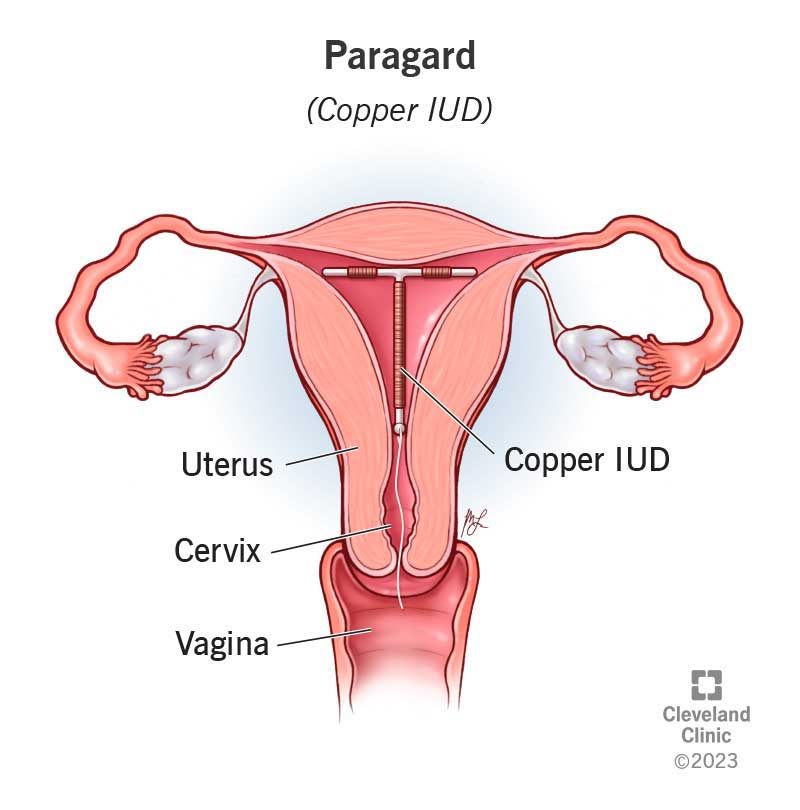ParaGard® is a copper intrauterine device (IUD) that you wear in your uterus to prevent pregnancy for up to 10 years. A healthcare provider must insert and remove an IUD for you. It’s up to 99% effective in preventing pregnancy.
Advertisement
Cleveland Clinic is a non-profit academic medical center. Advertising on our site helps support our mission. We do not endorse non-Cleveland Clinic products or services. Policy

Image content: This image is available to view online.
View image online (https://my.clevelandclinic.org/-/scassets/images/org/health/articles/17741-paragard-copper-iud)
An IUD (intrauterine device) is a small, T-shaped piece of plastic a healthcare provider inserts through your vagina and into your uterus to prevent pregnancy. A copper IUD is a type of IUD that contains copper.
Advertisement
Cleveland Clinic is a non-profit academic medical center. Advertising on our site helps support our mission. We do not endorse non-Cleveland Clinic products or services. Policy
There are two types of IUDs: hormonal IUDs and copper IUDs. Like the name implies, a hormonal IUD contains a hormone called progestin. A copper IUD doesn’t contain hormones. Instead, it uses copper to prevent pregnancy.
A healthcare provider must insert and remove a copper IUD (it takes a few minutes). It can prevent pregnancy for 10 years, but some studies show it can last longer in some people. You don’t have to keep the copper IUD for the full 10 years. It can come out whenever you want — either because you want to get pregnant or because you want to try another birth control method.
A copper IUD is made up of a plastic “T” wrapped in a copper coil. Because sperm don’t like copper, they avoid the IUD. This prevents sperm from reaching an egg. If sperm can’t get to an egg, you won’t get pregnant. Copper also helps change the lining of your uterus and cervical mucus, which makes it a less ideal environment for sperm.
In some situations, a healthcare provider may recommend a copper IUD as emergency contraception. This means that if a provider inserts it within five days (120 hours) of unprotected intercourse, it reduces the chance of an accidental pregnancy.
ParaGard® is the only copper IUD available in the United States today. Other countries, like Canada and the United Kingdom, have several other copper IUDs available.
Advertisement
A copper IUD works almost immediately. This is one of the reasons your provider may recommend it for emergency contraception.
ParaGard® is more than 99% effective. The only other birth control options with that level of effectiveness are the hormonal IUD and the birth control implant. For reference, the effectiveness of other birth control options (when used correctly) are:
One reason IUDs work so well: There’s less room for error. After you have an IUD in, it’ll continue working without any further action from you.
You may experience the following side effects in the days after you get a copper IUD:
These symptoms may go away or ease up after three to six months. If you continue to have more cramping than usual or heavy periods, contact your healthcare provider.
Studies show that having a copper IUD isn’t a direct cause of weight gain.
No, a copper IUD won’t stop your period because it doesn’t use hormones. But some people report irregular bleeding for several months after getting a copper IUD. Talk to your healthcare provider if periods stop completely while using a copper IUD.
Unlike birth control pills or other devices that are easy to forget, an IUD is a “set it and forget it” type of birth control. That means it’s super convenient and you don’t have to think about it every day or every month. Once your provider places it in your uterus, you’re getting the pregnancy protection you need for years.
Copper IUDs have other benefits, too. For example, they’re:
Overall, copper IUDs are a safe, effective form of birth control. Some potential risks of using Paragard include:
Advertisement
IUDs don’t protect you from sexually transmitted infections (STIs) or HIV/AIDS. Use a condom every time you have sex to lower your risk of getting or spreading STIs.
Yes, copper IUDs are safe for most people. Talk to your healthcare provider about your medical history before getting a copper IUD so they can help you decide if it’s the right birth control method for you.
Healthcare providers may advise against a copper IUD if you have:
Your provider won’t place an IUD if there’s any chance you’re pregnant. A negative pregnancy test is necessary before getting an IUD.
A copper IUD (Paragard) is a great “set it and forget it” birth control option for people who want convenience and reliability. But this type of birth control isn’t for everyone. Like all forms of contraception, there are also risks and side effects to a copper IUD. Be sure to discuss these with your healthcare provider. An important thing to remember about an IUD is your healthcare provider must insert and remove it. If you try Paragard and decide it’s not the right birth control for you, your provider can remove it and recommend something else.
Advertisement
Advertisement

Sign up for our Health Essentials emails for expert guidance on nutrition, fitness, sleep, skin care and more.
Learn more about the Health Library and our editorial process.
Cleveland Clinic’s health articles are based on evidence-backed information and review by medical professionals to ensure accuracy, reliability and up-to-date clinical standards.
Cleveland Clinic’s health articles are based on evidence-backed information and review by medical professionals to ensure accuracy, reliability and up-to-date clinical standards.
Your birth control needs to work for you. At Cleveland Clinic, we help you find the right birth control option to fit your goals and lifestyle.
